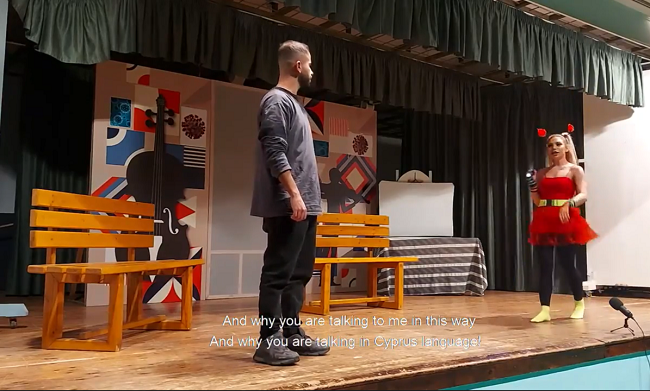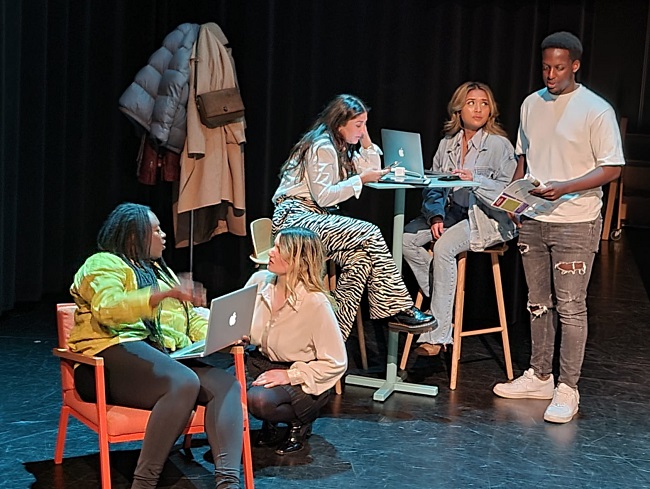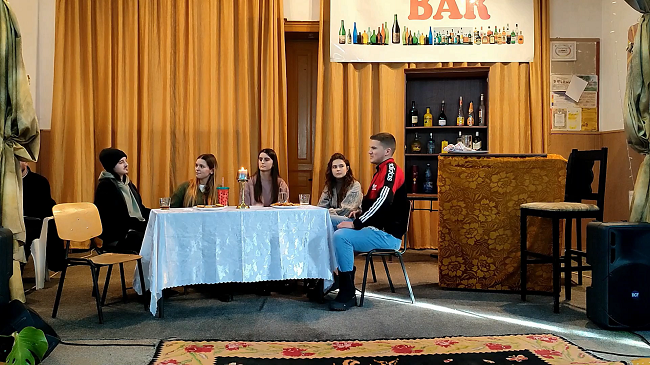CYT-project gives young people a voice during Corona
Covid-19 Youth Theatre (CYT) is a project that aims to contribute to the improvement of key competences of vulnerable young people.
CYT is an Erasmus+ Youth Project, which aims to contribute to the improvement of the level of key competences and skills of disadvantaged young people, in particular to the development of their creativity, expression through word and gesture, music and dance. In this blog we show how young people can express themselves in different ways and from different perspectives on a topic that directly affects them. During Corona, they felt mouthed; the theatre gave them the opportunity to make their voices count again.
Young people from five EU-member states came together to create a theatre performance in their own country about how COVID-19 affects their lives now and possibly in the future. Most of them had never acted before but wanted to participate because the subject appealed to them. They started to help write a scenario, invent roles and situations, and with or without the COVID-19 restrictions, they rehearsed, learned their lines, made their roles their own, learned how to use their voices and bodies on stage and had to work together to achieve a good result. After rehearsing for about six months, the time had come to perform in front of an audience consisting of parents, other young people, teachers and youth workers.
In all teams, during the development phase of the performance, we saw how the different phases (scriptwriting, rehearsing, performing and reflecting) became connected with the players' own development: inclusion, control, intimacy, empowerment and vision. All teams also experienced that working together, helping each other and stimulating each other was very important.
Working with theatre can offer young people the opportunity to express themselves and is also a tool that can inspire and activate them to take responsibility for themselves. Theatre offers young people the opportunity to create their own alternative images, to express their own challenges, desires, fears and problems.
It is recommended that youth workers and their educators start using this method in their work, as it strongly supports young people's empowerment, self-confidence and social participation. In support, we have also developed a scriptwriting manual, a series of videos, a methodology for working with theatre and guidelines for dialogue with the audience.
Cyprus
In Cyprus, several youngsters dropped out fairly early on because they could not combine rehearsals with school, studies or work. Fortunately, they managed to find substitutes and a performance of almost 50 minutes took place in December 2021, entitled Young people united to overcome COVID-19. Although it looks like a traditional play, there is no development of the characters: the youngsters mainly play how society views young people. We see the impact of COVID on young people: the search for positive activities, voluntary work and vaccination. The play starts with a special classical introduction in which COVID is personified as a man who is content with what he does. He is accompanied by his conscience constantly dancing around him as he attempts to infect passers-by. There is music between the different scenes and traditional Cypriot dancing is not missing either. The play ends in a demonstration in which there is discussion about what messages the young people want to transmit. Besides the mutual solidarity here is also room for disagreement.

Greece
In Greece, the set-up was complete in the summer of 2021, and rehearsals were already in full swing. The play was completely forged equally by the entire team, from the direction to the screenplay which was guiding their improvisations to setting the motivation and the feelings shared. The intention was to perform the show just before Christmas, but when the time came, the group itself was hit by Corona and the performance could not take place. Fortunately, the dress rehearsal had been recorded on video, so they were able to present and discuss the piece later online.The Greek piece is about how young people experience the pandemic. In contrast with the Cypriot performance, it is focusing on the differences. They chose a somewhat abstract staging which follows the timeline of Corona and the arrival of the different measures and show how different types of people react to these changes. There is, a pandemic denier, a sceptic, a scaredy-cat, a caregiver, a thoughtless person and a cautious person. All players are trapped in their own separate private space between the power of the government on the one hand and the external public space on the other. Central to the play is how the different types react to events. Only in the final scene towards the future do all the characters react uniformly.

The Netherlands
The Netherlands also had to find new players at the last minute. The Dutch youngsters take us along to a student house and show us what it is like to live with so many different personalities to share a common living room. We see anger and displeasure when online studying fails, frustration when going out, parties and festivals are no longer allowed. Food only can still be delivered at home. Fierce discussions about the sense and nonsense of the various Corona measures, but also about how they should deal with each other. We also see how each person seeks individual solutions such as dancing, playing sports and writing poems. And what happens when one of them directly facing Corona himself. They must do it together, but that is not always easy. Talking about it and listening to each other is important. Je suis Corona, the tile of the performance, you are what you make of Corona.

Romania
The Romanian play take us to a rural village where Corona seemed far away. It is called Monika's Bar, named after the village pub where everyone always meets. We are witnessing the situation there just before the pandemic and just after. It clearly shows what happened to the different characters. All have suffered to some extent, but in different ways. Facing sick and dying people, losing a partner, having to close the bar, losing work and income. But there is also one who has benefited from the situation. During the rehearsal period, rehearsals had to be stopped temporarily because Corona struck among the actors. The play had become reality.

Poland
In Poland the text of the play was written during rehearsals. The young actors acted out different scenes by improvising and each improvisation was recorded. The dialogues were then written down and formed the basis of the play. In the performance, we see youngsters locked in their rooms. They communicate with the world and with each other, during classes and at a distance, via online instant messaging. Through the dialogues we get to know the main characters. The play is about the different characters of these people, their relationships and how they relate to Corona. What happens when one of them has not heard from you for a long time? A psychological drama of gossip, fake news and manipulation unfolds against a backdrop of each person's dominant emotions, and at the same time the play deals with the role of social media and online communication.

All performances were captured on video and can be downloaded form Google drive https://drive.google.com/drive/folders/1UP8VKRfSPx-_8mObm9FeW0udJK40oHC8




